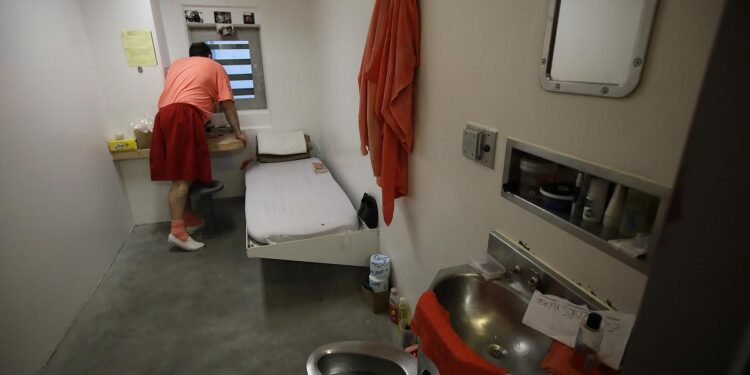As a thought experiment, head to your nearest private bathroom, close the door and imagine spending at least 22 hours a day there by yourself for the next few weeks, months, or maybe even decades. If you’ve never been held in solitary confinement, this is a useful approximation of the space that about 6% of people incarcerated in the U.S. are limited to at any given time.
If that sounds bleak, try relocating to the shower stall, and running that thought experiment again. That was the circumstance for several men incarcerated in Oklahoma, according to a lawsuit filed earlier this month. In some cases, the men were locked into “micro solitary” cells — as small as 2 feet wide by 2 feet long — for several days at a time, and for multiple stints, according to the suit. The practice is not without precedent, as a Tampa Bay Times report found instances where Florida state prisons were locking people in showers last year.
The Oklahoma Department of Corrections told McClatchy News that it used the cells because of overcrowding, not as a means of punishment, and that it has discontinued the practice. Meanwhile, several men detained at a New York jail filed another suit this week arguing that they’ve been punished with solitary confinement for refusing to perform unpaid work. Since the men are pretrial detainees who have not been convicted of a crime, they argue that this kind of coerced labor amounts to a violation of the 13th Amendment, which prohibits slavery except as punishment for a crime.
Whether solitary confinement is in a small cell or a really small cell, as a punishment, or to address overcrowding, it is widely accepted that prolonged experience of it is extremely psychologically damaging. Some experts and people who’ve spent time in solitary say it often amplifies the extremes of the most dehumanizing aspects of incarceration, whether that’s brutal summer heat or inedible food.
At a Senate hearing on Tuesday, Nicole Davis called the nearly 12 months she spent in solitary confinement “torture.” Davis testified that each stint left her “traumatized, anxious, breathless, and deeply depressed.” After serving more than 13 years in federal prison, Davis now runs a nonprofit that works with children of incarcerated parents.
The hearing was intended to focus attention on two recently introduced Senate bills on solitary that would dramatically limit its use in federal prisons and immigration detention settings. The bills, like similar efforts last year, face long odds in an increasingly ineffectual Congress. If enacted, they would require that prisons and detention centers use solitary confinement as little as possible, guarantee at least four hours a day outside the cells for people in isolation, and ban solitary completely for certain people, including anyone who is under 25 years old, pregnant, or diagnosed with a serious mental illness.
Had such a proposal been law four years ago, 61-year-old Charles Leo Daniel likely would have been exempt from solitary. Instead, Daniel spent nearly three-and-a-half years in solitary at the Northwest Immigration and Customs Enforcement Processing Center in Tacoma, Washington, before he died in March. According to immigration officials, Daniel had a significant (but unspecified) mental illness. Additional reporting from The Seattle Times found that Daniel spent nearly 10 years in solitary in state prison on a second-degree murder conviction before he was turned over to immigration detention for deportation in 2020.
Little else is known about Daniel, including what killed him, or why he spent so much time in isolation. A recent report from the University of Washington’s Center for Human Rights found that Daniel endured the second-longest isolation stint of anyone in migrant detention since 2018. The same report found that the Tacoma facility has used more solitary confinement than any other detention facility in the country, and that comes at a time when the use of solitary in detention centers is on the rise.
Like most immigration detention centers, the Northwest ICE Processing Center in Tacoma is privately operated. Washington state officials have tried to shutter the facility by outlawing the operation of private detention facilities in the state, but the move may be preempted by federal law.
In New Jersey, where state lawmakers passed a similar bill, the Biden Administration has joined with private prison companies to try to have the law tossed on constitutional grounds; and have won the first battle to bar the law’s enforcement. In some ways, it’s another chapter in a battle that’s been playing out for months, as states and the federal government jockey over immigration policy.
The Senate bill would also keep people under 25 out of solitary confinement, as research has shown that brain development continues into the mid-twenties. In the federal system that would mostly mean young adults, ages 18 to 24, as the system incarcerates few minors. But the same efforts, if made by states, could have a profound impact on children and teens, who face increased risks from solitary confinement. In North Carolina, a recent lawsuit alleges that a group of 15-to-17-year-olds — all of whom are Black — are continuously locked in cells so small that “the extent of their movement is limited to push-ups.”
In a filing earlier this month, the state denied the claims.



























